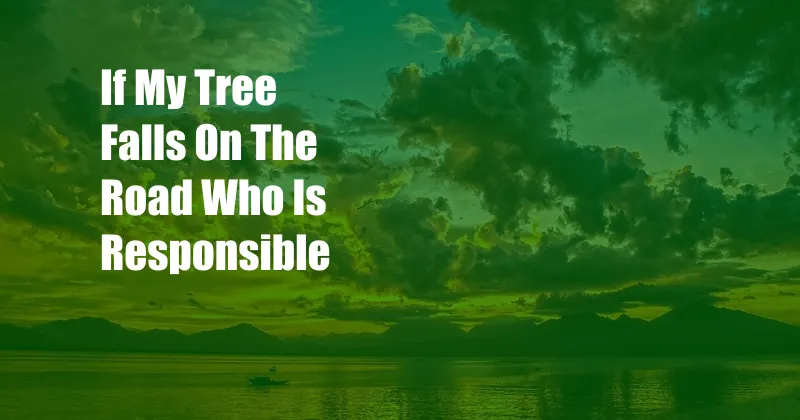
Who’s Liable: If a Tree Falls on the Road, Whose Responsibility Is It?
Imagine a peaceful drive through the countryside, when suddenly, a mighty oak tree creaks and collapses, crashing onto the road ahead. As you sit there, startled, a question races through your mind: who is responsible for this fallen debris and any potential damage?
Determining Liability
The answer to this question lies within the complex realm of property law and negligence, varying depending on several factors:
1. Ownership of the Tree:
- Public Property: If the fallen tree is located on public property, the local government or municipality is generally liable for maintaining its trees and preventing hazards.
- Private Property: If the tree is on private property, the owner of that property is responsible for its upkeep and any potential damage it may cause.
2. Negligence:
Determining negligence is crucial in tree-fall cases. If the property owner or government failed to take reasonable measures to prevent the tree from falling, despite knowing or having reason to know about its hazardous condition, they may be found negligent. Factors considered include:
- Tree condition: Age, disease, and structural defects
- Maintenance history: Regular inspections, pruning, or removal of dead limbs
- Weather conditions: Extreme winds or storms that could have damaged the tree
3. Foreseeability:
A key element in negligence is foreseeability. If a reasonable person could have anticipated that the tree posed a risk and could fall, the property owner or government may be held liable even if they were not aware of its specific condition.
Recent Developments and Insights
In recent years, several updates and news sources have highlighted the evolving landscape of tree-fall liability:
- Increased Awareness: Public awareness about tree maintenance and safety has grown, leading to more frequent inspections and proactive tree management.
- Legal Precedents: Court rulings have set precedents that clarify the duty of care and foreseeability in tree-fall cases, influencing future judgments.
- Social Media Discussions: Forums and social media platforms have fostered discussions on tree-fall responsibilities, sharing experiences and raising awareness.
Tips and Expert Advice for Staying Safe
To avoid accidents and potential liability, consider these tips from experienced arborists:
- Regular Inspections: Regularly inspect trees on your property for signs of decay or damage. Seek professional assistance from a certified arborist if needed.
- Proper Maintenance: Prune trees regularly to remove dead or diseased limbs, and perform root pruning to prevent sidewalk damage.
- Early Removal: If a tree appears to be in poor condition, consider removing it proactively to prevent potential hazards.
Common FAQs on Tree-Fall Liability
Q: What if the tree falls on my car while it’s parked on the street?
A: If the tree is on public property, you may file a claim with the local government. If the tree is on private property, you can contact the owner’s insurance company.
Q: Can I be held liable if my tree falls on a neighbor’s property?
A: Yes, if you were negligent in maintaining the tree and it was reasonably foreseeable that it could fall.
Q: What if the tree was struck by lightning or extreme weather?
A: In such cases, liability may still be applicable if the property owner failed to take reasonable steps to mitigate potential risks associated with the tree’s condition.
Conclusion
Determining liability in tree-fall cases is complex, considering factors such as tree ownership, negligence, and foreseeability. By understanding these legal principles and following expert advice, you can help prevent accidents and protect yourself and others from potential harm.
Are you interested in learning more about the topic of tree-fall liability? Let us know in the comments below!